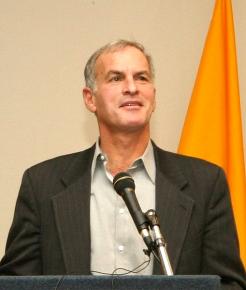Why won’t they let him speak?
, a member of Clark Students for Palestinian Rights at Clark University in Worcester, Mass., reports on planned protests against the school's decision to cancel a speech by Palestinian rights supporter Norman Finkelstein.
ON MONDAY, April 6, the president of Clark University, John Bassett, canceled a speaking engagement by Dr. Norman Finkelstein, citing a bad "situation" because of an incoming conference for graduate students on Holocaust and Genocide studies sponsored by the university.
CUSPR is not laying down in the face of the cancellation of our event and the subjugation of free speech at Clark. We've been organizing and educating people all week and plan a protest on April 13 at 1:30 p.m. in Red Square, the center of our campus. The purpose of the protest is to demonstrate to the administration that students believe in free speech and academic freedom.
Clark University Students for Palestinian Rights (CUSPR) decided in the middle of February to bring Finkelstein to campus. After contacting him, he agreed to speak sometime in April--looking at the calendar, we chose the week of April 20, which was agreeable to Dr. Finkelstein. Shortly after, he suggested April 21.
We then began publicizing the event through Facebook and also sought funding through various clubs at Clark. However, we met with Clark's campus Jewish organization, Hillel, which objected to the date of April 21 because it happened to coincide with Israel's Holocaust Remembrance Day. Though Dr. Finkelstein was not going to speak on the Holocaust, but on the Israeli-Palestinian conflict, we thought it would be respectful to change the date. Dr. Finkelstein and CUSPR agreed to reschedule the appearance for April 23.

On the morning of April 6, the CUSPR executive board was called to a snap meeting by the president's office for later that day. At the meeting, which was attended by President Bassett, Provost David Angel, head of Student Leadership and Programming Mike McKenna and our faculty advisor Kristen Williams, along with three members of the CUSPR e-board, President Bassett stated plainly that we could not host the event this semester at Clark. He called the timing "unfortunate," referring to the Holocaust Studies Graduate Student conference going on at Clark that week.
When asked what he thought about the Norman Finkelstein, Bassett called him an "extremist" and "beyond controversial," and also compared Finkelstein's position on the Israeli-Palestinian conflict to a white supremacist group's position on race. When we disagreed with this assertion, he dismissed the disagreement, saying, "one man's extremist is another man's moderate." He also said that the event came to his attention after Jack Foley, head of campus security, brought it to his attention, and only he and Provost Angel had discussed the issue.
When asked whether we could reschedule another speaker for that week, the president and provost both made it known that we should not schedule another speaker without their approval, and that it would be better for us "hold off." Finally, President Bassett said that he would like to see "focused dialogue" and "faculty engagement" on the issue of which speakers should and should not come to campus--with this discussion taking place in September 2009.
Following the meeting, CUSPR members met to discuss our plan of action for the rest of the semester. In the course of three days, we agreed that we needed to begin petitions to submit to the president on the issue of free speech and the interests of Clark students.
We also planned several events to demonstrate that Clark students support potentially controversial speakers coming to campus for forthright discussions, and also to show that students, faculty and the larger community did not accept cancellation of the event without discussion or input from anyone outside of the president's office.
This Monday, April 13, CUSPR is holding a protest in Red Square on campus to demonstrate the community's anger with the decision and to support, more broadly, the freedom of students to make their own decisions on what is controversial on campus. We will be submitting the petitions to President Bassett next Monday on April 20. We have also written a letter to President Bassett, asking him to reconsider his decision and bring Dr. Finkelstein to campus this semester.


